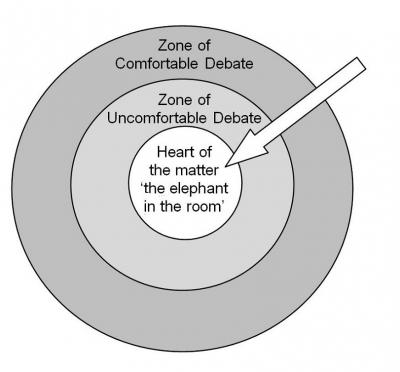Continuing their series on challenging coaching, Ian Day and John Blakey take a look at the benefits of getting into the zone of uncomfortable debate.
ZOUD - the zone of uncomfortable debate - is one of those pithy little phrases that we wish we had thought up ourselves. However, it was first coined by Professor Cliff Bowman as part of his research at Cranfield School of Management into the nature of high performing teams – see this video clip for a summary of the Cranfield thinking. Our contribution is to take the concept of the ZOUD and bring it into the field of individual executive coaching.
In our book Challenging Coaching, we suggest that being comfortable to enter the ZOUD is critical to being able to adopt a more challenging stance in executive coaching and to get to the heart of the issue. For most of us entering the ZOUD does not come naturally since we have learnt the skills of comfortable debate and we have learnt to prize rapport highly in our everyday relationships. In particular, those who are attracted into the helping professions may be particularly sensitive to entering the ZOUD fearing that it will lead to conflict and confrontation which rubs against our immediate values.
However, the times we live in demand that we enter the ZOUD more often since our economic reality is being squeezed and we are running out of easy answers. The traditional options of prevarication, collusion or denial are proving less effective both on a macro scale as evidenced by the persistent euro zone debt crisis as well as at a micro level where individual patience is running thin regarding traditional forms of leadership, stifling bureaucracy and endless, polished spin.
So how do coaches boldly and skillfully enter the ZOUD? The diagram below will help create a picture of the process.

Often in our coaching we will be in the zone of comfortable debate, the outer circle of the diagram. This is natural and serves our purpose for considerable elements of the coaching need. However, there will come decision points in the coaching conversation where the coach can decide to enter the ZOUD, the inner circle, in the pursuit of discovering the ‘elephant in the room’.
Most likely the trigger for these decision points will arise when the goals of the coaching are not being achieved to the satisfaction of all the stakeholders involved. One of these stakeholders is the coach themselves but others include the coachee, the sponsoring line manager, the HR director, etc.
There is always a temptation to shy away at this point, to take the easier path of collusion, denial or prevarication. A coach needs to steel themselves, take a deep breath, grit their teeth and summon the motivation to enter the ZOUD in the service of the wider transformation of the individual, team and organisational reality. None of us really wants to look back and think that we missed the opportunity to really make a difference, to be another person who ‘let them get away with it’ and turned a blind eye . . . or do we?
How do we know when we have ducked the issue? You might hear yourself saying, ‘I’d like to build on what you have just said’ and then go off on a random tangent. You might drop in a quick, ‘That’s interesting, let’s come back to it later’ and then never do. You might kick for touch with a professional sounding ‘I think this is an issue that is more appropriate to discuss with your line manager rather than myself’. Or you might say nothing and use your finely tuned listening skills to let the coachee talk themselves into the ground trusting that they will run out of energy at some point and then you can summarise it back to them and move on. I know I’ve used each of these strategies at times and probably many more.
What helps me to enter the ZOUD more often is to create a trigger for myself – a little mental switch which I flick to ‘On’ rather than ‘Off’ at these decisions points and once I have done this I find I say something different like:
- ‘Now hang on a minute, what’s really going on here?’
- ‘You know this doesn’t really fit with my experience of the reality of this organisation.’
- ‘I’m really disappointed in what you have just told me.’
- ‘Right now, you remind me of a clockwork train I had as a child which just used to go round and round in circles.’
These are edgy, provocative statements that carry short term ‘breaking the rapport’ risk yet plunge the conversation into the ZOUD at which point things get unpredictable, novel and potentially transformational. In my experience, the reaction of the coachee to the above statements, when delivered from a foundation of mutual trust and respect, ranges from silence to laughter, anger, shock and intense curiosity. Most interesting is when the coachee completely ignores the statement and refuses to let it interrupt the pattern, the current story, the prevailing trance. That’s when you know you really have a challenge on your hands!
Ian and John's book 'Challenging Coaching- Going beyond traditional coaching to face the FACTS' published by Nicholas Brealey Publishing is available on Amazon. More resources can be accessed via www.challengingcoaching.co.uk. This is the fourth of a monthly column on TrainingZone to explore the detail of challenging coaching









